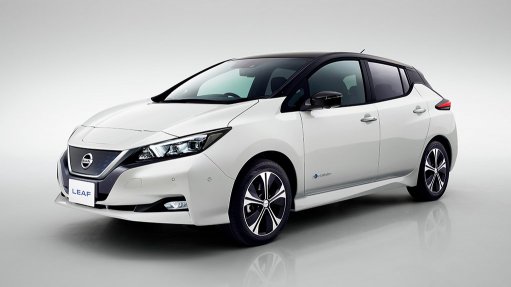
The Nissan Leaf 2
If South Africa does “not move quickly” on creating a market for electric vehicles, “we’ll be left behind”, warns Nissan Group of Africa MD Mike Whitfield.
Also, should the South African automotive industry wish to achieve its long-stated objective of producing a million or more vehicles a year locally, “it would have to include new technology”.
Alternative drive trains are “snowballing” globally, seeing “massive momentum”, says Whitfield.
BMW Group South Africa and Nissan South Africa have both put pressure on government to reduce the import duties on electric vehicles (EVs), with no success to date.
Whitfield says the automotive industry has, “up to now” been fragmented on how to approach the EV question. However, the industry is working on speaking with “a united voice”, especially in seeking policy clarity from government.
“You’ll see a lot more coming out of the National Association of Automobile Manufacturers of South Africa (Naamsa) going forward.”
Whitfield says it is important for industry and the government to look at duty structure in creating a local market for EVs, before moving to manufacturing these vehicles in South Africa.
“Let’s create a market first.”
Creating a market can happen not only through cutting import duties, but also through owners not paying toll or vehicle licence fees, for example.
“These are all possible enablers,” says Whitfield.
Following favourable duty structures for the import of EVs, the country would need to create charging infrastructure.
Whitfield says it has become clear that infrastructure requirements will not be as onerous as once imagined, as EVs are rapidly increasing their range, which, in turn, reduces range anxiety.
He adds that the new Leaf should be launched in the local market in 2019.
Nissan was the first to launch a full EV in South Africa, in the form of the Leaf. This was followed by the BMW i3.
The original Leaf has a range of 135 km. The next-generation Leaf promises a range of at least 240 km.
According to the Automotive Export Manual 2018, hybrid petrol and diesel vehicle sales in South Africa comprised 306 units in 2017, down from the 515 units in 2016.
EV sales declined from 100 units in 2016, to 68 units in 2017.
Duty Decrease Application
An application from BMW Group South Africa to cut import duties on EVs to 0% has not yet yielded any results.
There is also an application that requests import duties on EVs from the European Union (EU) to be cut from 25% to 18%, in order to take it to a level similar to internal combustion engine vehicles being imported from the EU.
Naamsa director Nico Vermeulen says the Department of Trade and Industry has not yet delivered a verdict on this application.